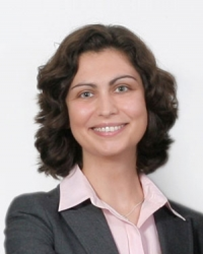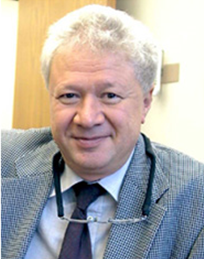 Elena Marinova
Elena Marinova
Musala Soft, Bulgaria
http://www.musala.com/
Keynote on: Internet of Everything - what awaits us?
 Nikola Kasabov
Nikola Kasabov
Knowledge Engineering and Discovery Research Institute, Auckland, New Zealand
http://www.kedri.aut.ac.nz
Keynote on: Deep Learning in Spiking Neural Networks for Brain-Inspired Artificial Intelligence
View abstract
Biography:
Nikola Kasabov is Fellow of IEEE, Fellow of the Royal Society of New Zealand, DVF of the Royal Academy of Engineering, UK and the Scottish Computer Association. He is the Director of the Knowledge Engineering and Discovery Research Institute (KEDRI), Auckland and Professor at the School of Engineering, Computing and Mathematical Sciences at Auckland University of Technology. Kasabov is President-Elect of the Asia Pacific Neural Network Society (APNNS) to serve as the President in 2019. He is a Past President of the International Neural Network Society (INNS) and APNNS. He is a member of several technical committees of IEEE Computational Intelligence Society and a Distinguished Lecturer of the IEEE CIS (2012-2014). He is a Co-Editor-in-Chief of the Springer journal Evolving Systems and serves as Associate Editor of Neural Networks, IEEE TrNN, -Tr CDS, -TrFS, Information Science, Applied Soft Computing and other journals. Kasabov holds MSc and PhD from the TU Sofia, Bulgaria. His main research interests are in the areas of neural networks, intelligent information systems, soft computing, bioinformatics, neuroinformatics. He has published more than 600 publications that include 15 books, 220 journal papers, 28 patents and numerous chapters and conference papers. He has extensive academic experience.
 Peter Stanchev
Peter Stanchev
Computer Science Department, Kettering University, USA
http://paws.kettering.edu/~pstanche/
Keynote on: Building the Innovative and Entrepreneurial University
View abstract
Biography:
Peter Stanchev is Professor at Kettering University, Flint, Michigan, USA. He has M.Sc., Ph.D. and D.Sc. in Mathematics/Computer Science from Sofia University. He is also a pro-fessor in the Software Engineering and Information Systems Department at the Institute of Mathematics and Informatics, Bulgarian Academy of Sciences. He has forty five years of professional experience in of multimedia systems, database systems, multimedia semantics, education, open access to scientific information and data and medical systems. He has published 2 books, more than 200 chapters in monographs, journal and conference peer-reviewed papers, more than 200 conference papers and seminars. Serving also on many database and multimedia conference program committees, he is currently editor-in-chief and member of the editorial boards of several journals. He is the Bulgarian representative in the EU OpenAIRE projects.
Deep Learning in Spiking Neural Networks for Brain-Inspired Artificial Intelligence
Nikola Kasabov
Abstract:
Brain-inspired AI (BI-AI) is the contemporary phase in the AI development that is concerned with the design and implementation of highly intelligent machines that utilise information processing principles from the human brain, along with their applications. Artificial neural networks (ANN), in their early developments world-wide were promising techniques for AI from the very beginning. But their full potential is just being realised through the latest brain-inspired spiking neural networks (SNN) and their deep learning algorithms, that make it possible for AI to gain a fast progress nowadays. This presentation has two parts. The first part covers generic methodological aspects of AI and neural networks, including: Learning evolving processes in space and time; Data, Information and Knowledge; The human brain as a deep learning system; Classical methods of ANN; Methods of SNN; Deep learning in brain-inspired SNN architectures; Evolutionary and quantum-inspired optimisation of SNN systems. The second part presents specific methods, systems and applications based on deep learning in SNN and BI-AI for various problems and data, including audio/visual data, brain EEG and fMRI data, Brain-Computer Interfaces (BCI), Bio/Neuroinformatics data, Multisensory data for predictive modelling in ecology, environment, finance. It concludes with discussions about the future of computers and AI. A development software system NeuCube and application systems can be found on: http://www.kedri.aut.ac.nz/neucube/.
Building the Innovative and Entrepreneurial University
Peter Stanchev
Abstract:
How entrepreneurship can be taught? The positive feedback loop at the Massachusetts In-stitute of Technology for spirit & skills which creates the successful entrepreneurial ecosys-tem. How entrepreneurship can be including in the curriculum? Entrepreneurship in different Disciplines. Teaching the Entrepreneurial Mindset in Computer Science classes. Innovation and entrepreneurship organization in high education: KEEN a network of thousands of faculties, working to unleash undergraduate students so that they can create personal, economic, and societal value through the entrepreneurial mindset; DECA - an international association of high school student and teachers of marketing, management and entrepreneurship in business, finance, hospitality and marketing sales and services. Innovation and entrepreneurship at Kettering University: The T-space to transforming their mindset to "think, tinker, and thrive"; facture two, built on the idea that learning, sharing, and creating are empowering and transformative forces which can open doors and revolutions both perceptions and realities; innovation and entrepreneurship minor at the school of management; Kettering Entrepreneurship society.
Keynote speakers from: 2017 | 2016 | 2015 | 2014 | 2013 | 2012 | 2011
